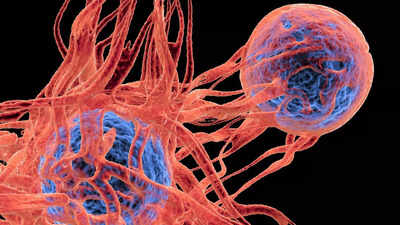Health
New Study Links Rectal Bleeding to 850% Higher Cancer Risk

A recent study conducted by researchers at the University of Louisville Health has established a significant link between rectal bleeding and an alarming 850% increase in the risk of colorectal cancer among adults under the age of 50. This research, which analyzed the medical records of 443 patients who underwent colonoscopies between 2021 and 2023, raises critical concerns regarding current screening practices for younger individuals.
The findings reveal that nearly 70% of the young patients diagnosed with colorectal cancer had no family history of the disease. This statistic underscores a potential oversight in existing screening guidelines that may fail to identify at-risk populations.
Rectal Bleeding as a Key Indicator
Among various symptoms reported by patients, rectal bleeding emerged as the most significant predictor of early-onset colorectal cancer. The study found that almost half of the participants diagnosed with the disease exhibited this symptom. Dr. Sandra Kavalukas, a colorectal surgeon at the University of Louisville School of Medicine and the study’s senior author, emphasized the importance of recognizing this warning sign.
“Many of the early-onset colorectal cancers that I see have no family history,” Dr. Kavalukas stated. “This research lends support to the question of who does or doesn’t warrant a colonoscopy: if you have a person below the screening age with rectal bleeding, you should seriously consider a colonoscopy.”
The implications of these findings extend beyond individual cases, highlighting gaps in current clinical practices and the need for a reevaluation of screening criteria.
Key Findings and Clinical Implications
The study identified several noteworthy trends among the participants. Notably, 88% of patients diagnosed with early-onset colorectal cancer had undergone colonoscopy due to symptoms like rectal bleeding. In contrast, only 55% of individuals without cancer had similar procedures prompted by their symptoms.
The research also indicated a limited role for genetics in early-onset colorectal cancer, with only 13% of cases showing genetic alterations linked to hereditary syndromes. Family history was found to increase the risk of developing the disease by merely two-fold, which is considerably less than previously assumed.
Additionally, lifestyle factors play a role, as former smokers exhibited nearly double the risk of developing early-onset colorectal cancer.
Current guidelines in the United States recommend routine screening for colorectal cancer starting at age 45 for average-risk individuals. However, the rising incidence of colorectal cancer among younger adults highlights the urgency of addressing symptoms such as rectal bleeding.
Dr. Kavalukas pointed out the nuances in symptom presentation: “If they’re 35 and they come in with rectal pain, they probably don’t need a colonoscopy. But if they come in with a bleeding complaint, they are 8.5 times more likely to have colorectal cancer.”
The findings from this study aim to provide clinicians with clearer guidelines on prioritizing diagnostic colonoscopies for younger adults, even if they fall outside the traditional screening age group.
As awareness grows around the risks associated with colorectal cancer, especially in younger populations, the medical community may need to adapt its approach to early detection and intervention.
-

 World5 months ago
World5 months agoSBI Announces QIP Floor Price at ₹811.05 Per Share
-

 Lifestyle5 months ago
Lifestyle5 months agoCept Unveils ₹3.1 Crore Urban Mobility Plan for Sustainable Growth
-

 Science4 months ago
Science4 months agoNew Blood Group Discovered in South Indian Woman at Rotary Centre
-

 World5 months ago
World5 months agoTorrential Rains Cause Flash Flooding in New York and New Jersey
-

 Top Stories5 months ago
Top Stories5 months agoKonkani Cultural Organisation to Host Pearl Jubilee in Abu Dhabi
-

 Sports4 months ago
Sports4 months agoBroad Advocates for Bowling Change Ahead of Final Test Against India
-

 Science5 months ago
Science5 months agoNothing Headphone 1 Review: A Bold Contender in Audio Design
-

 Top Stories5 months ago
Top Stories5 months agoAir India Crash Investigation Highlights Boeing Fuel Switch Concerns
-

 Business5 months ago
Business5 months agoIndian Stock Market Rebounds: Sensex and Nifty Rise After Four-Day Decline
-

 Sports4 months ago
Sports4 months agoCristian Totti Retires at 19: Pressure of Fame Takes Toll
-

 Politics5 months ago
Politics5 months agoAbandoned Doberman Finds New Home After Journey to Prague
-

 Top Stories5 months ago
Top Stories5 months agoPatna Bank Manager Abhishek Varun Found Dead in Well









